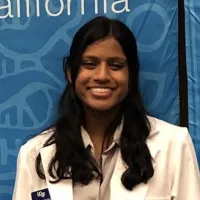
From One-eyed Sheep to Anti-Cancer Drugs: The Story that Stole the Postdoc Slam
A fascinating story about how a one-eyed sheep and an atypical photo-bomb earned a UCSF postdoc top honors at the 4th annual UCSF Postdoc Slam on Thursday, Sept. 19 — an event that host Graduate Dean Elizabeth Watkins called the closest thing to a football game UCSF has.
A growing sense of excitement energized the room as Byers Auditorium at the UCSF Mission Bay campus nearly filled to its 261-person brim. Some audience members came fully prepared with brightly-colored props to cheer on friends while others arrived seeking more knowledge of the wealth of research being performed at one of the nation’s top research institutions.
As one of the many events planned for National Postdoc Appreciation Week Sept. 16 to 20, UCSF’s Postdoc Slam aimed to highlight some of the research that UCSF’s almost 1,000 distinguished postdocs perform each day and to enhance the critical skills of scientific communication by hosting a competition that determined who could present their research in the most compelling and entertaining fashion in just three minutes.
The top prize of $3,000 this year went to Ishan Deshpande, a postdoctoral fellow at UCSF’s Manglik Lab. Deshpande captured the audience with his presentation on the elucidation of the structure of an essential transmembrane protein called Smoothened and its role in the advancement of certain cancers. With this newfound insight, Deshpande hopes to significantly progress the development of antineoplastic drugs.
Even with such high ambitions, Desphande was amazed when he was announced the winner of the Postdoc Slam.
“All the contestants were so good that I still cannot imagine that they chose me as the winner,” Deshpande told Synapse in the moments after his win.
Deshpande’s presentation, titled “From One-eyed Sheep to Anti-Cancer Drugs,” captivated the crowd. Silence fell when he told the eerie story of the discovery of one-eyed sheep in Idaho whose birth abnormalities were caused by the aptly-named alkaloid cyclopamine in the wildflowers they grazed on, and laughter erupted when he referred to the unpredicted cholesterol molecule in his crystal structure as “photo-bombing” the structure.
Deshpande was one of 10 postdoctoral finalists who made it through the first round to compete in the live event at Mission Bay. A panel comprised of five esteemed judges looked for comprehension, content, engagement, and communication — and for more specific factors like the delicate balance between avoiding scientific jargon while not over-generalizing the research.
The judges’ panel included Moira Gunn, PhD, a former NASA scientist, engineer, and software programmer and a current associate professor in the Biotechnology program at UCSF, and Sara Kenkare-Mitra, PhD, the senior vice president of development sciences at Genentech.
“You have to be able to explain the science to non-scientific people, while at the same time making it an interesting story,” Gunn said regarding selecting Deshpande as the winner. “Funny remarks that actually served that purpose were really well-received.”
Kenkare-Mitra also provided some insight into the selection process.
“Some contestants had good background but didn’t quite get into the crux of their research and findings,” she said. “[But] they were all fantastic.”
Aparna Bhaduri took second place and $1,500 with her compelling presentation on “jumping” cells and their role in the development of glioblastomas, and Brian Chiou won third place and $1,000 for his talk on stimulating the myelination of nerve cells in patients with multiple sclerosis.
Ziyang Zhang also won the audience’s vote for the People’s Choice award and $750 for his talk about developing drugs that specifically target oncogenic pathways in the brain.
Both Deshpande and Zhang were open about the impact the competition had on cultivating their scientific communication skills.
“Now that I look back on my other talks,” Deshpande said, “they were all very boring and I don’t think I put enough effort in my talks to make sure that everyone in the room understands what I’m saying.”
Zhang echoed the sentiment.
“Honestly, before I came to UCSF it didn’t even occur to me as an important skill,” Zhang said. “Of course it is an important skill, but I was just in my own bubble of doing my research.”
“I think UCSF does such a good job in training people [on how to give a pitch and sell your ideas],” Zhang added. “There’s Grad Slam, Postdoc Slam, entrepreneur workshops.”
When asked what they would spend their winnings on, Deshpande and Zhang both said they would first buy their lab mates and friends, who spent long hours helping them prepare for their presentations, a round of beer.



